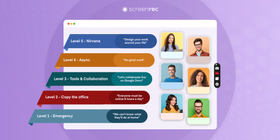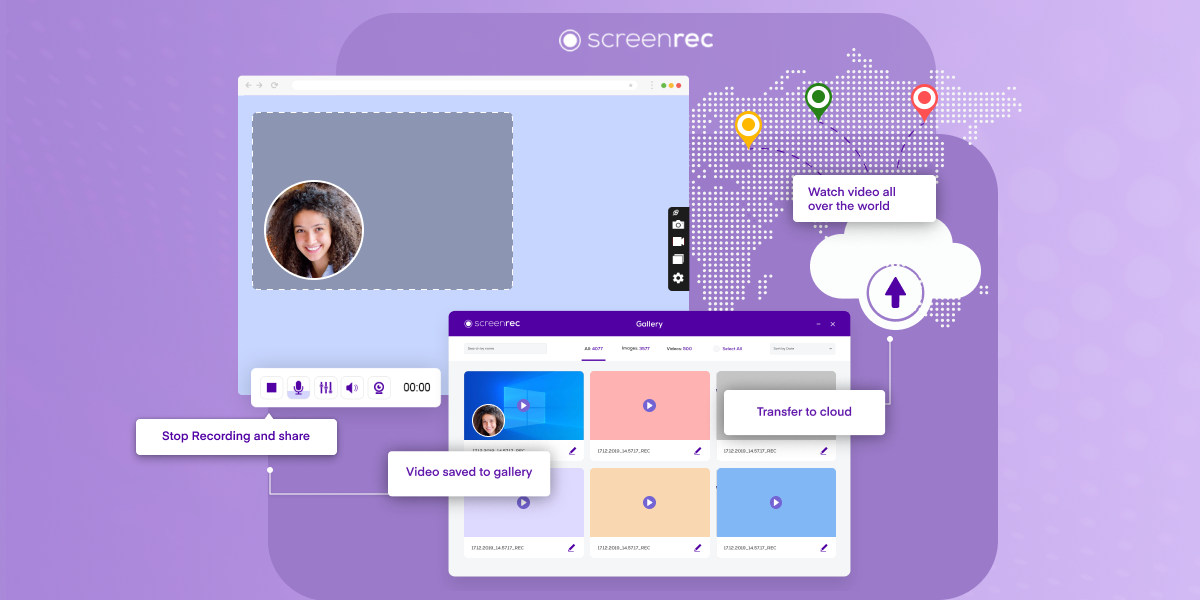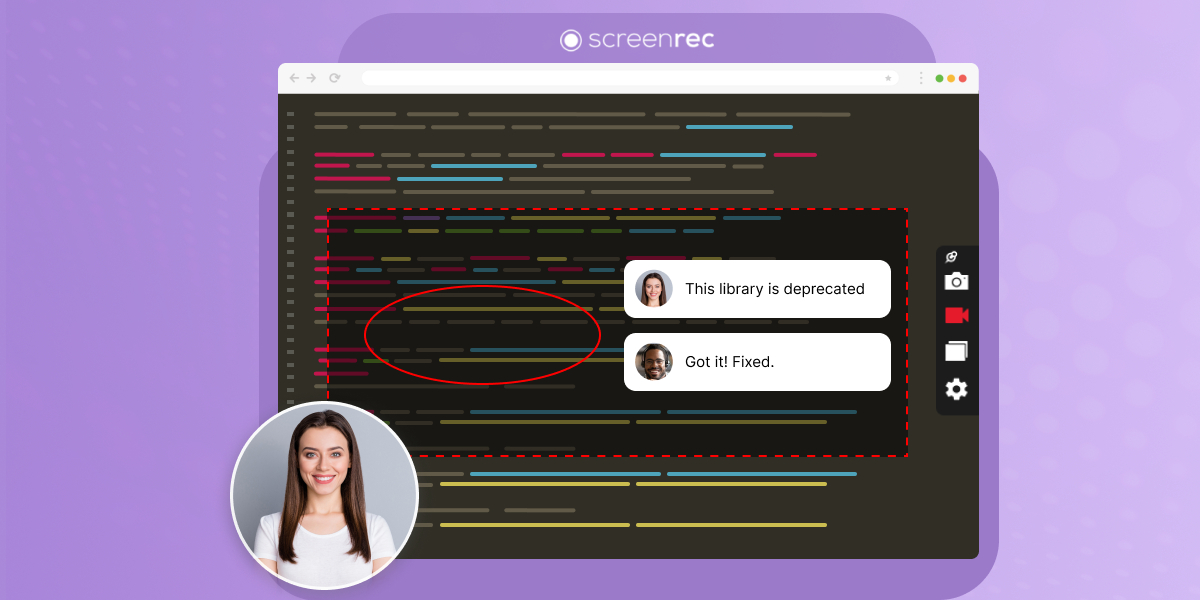How To Manage A Remote Development Team Without Stress
In 2024 working from home is a normal part of life. It no longer looks weird to take your laptop to a coffee shop and spend three hours there staring at the monitor or even attending an online meeting. With most technical teams already working online, it’s easy to make the transition to a fully remote developer team.

Software for remote teams and a communication tool make it easy to connect over different time zones with your team members. Besides, remote software development teams can use special remote working tools, to keep track of work hours or to collaborate better.
This is the article for you if you need to know more about managing remote software developers.
The basics of managing a team of remote developers

When managing remote development teams it’s important that your employees always feel included and connected. Video conferencing is an excellent way to achieve that. It enables you to not only collaborate with remote colleagues but also to motivate your team and share experiences. You may use it for anything — from organizing remote team-building activities to sharing portfolio examples.
Then there is project management software which provides basic communication capabilities and helps workers manage their time when working remotely. This is the space where everyone should feel comfortable to reach their maximum efficiency.
When managing a remote team, keep in mind that you aim to motivate and not reprimand. You should show your distributed team how efficiency, customer focus, and company rules benefit them, not the company. Avoid these types of statements:
- We will lose a client
- We will incur losses
- We will get negative feedback from the client
It is better to present this information by showing the benefit to everyone. Here are some of the benefits that you can use to motivate your remote development team:
- Easier communication. It’s good for an employee when a client develops a successful long-term working relationship. The team member will learn the client's preferences and will be efficient in receiving and understanding tasks and solving any problems. In such a trusting working relationship, the client will be likely to forgive when a mistake is made.
- Financial gain is another beneficial point to motivate team members. A loyal client may give a positive review or recommendation and bring more development projects to the company. This will increase the revenue and the company’s financial stability. If your company has a performance-bonus structure, a positive review will result in a bonus for the team member.
- Professional and career growth. With financial stability and revenue increase, your company will be able to launch new projects and new services. This will help you hire more employees and you’ll be able to provide opportunities for developers to become project managers, team leaders, etc.
It’s always best to show benefit on a personal level to motivate your team. Your developers will be excited to work as efficiently as possible when they can see the personal gain in this.
Time management in a remote development team

Most remote development teams have one common problem: difficulty tracking work hours. Imagine that you have hired a frontend development team but they either don't register their working hours on time or they don't register their hours correctly. This happens often.
But why is this important? Does it even matter?
Yes, there are two big reasons why you should keep correct time logs:
- Ability to assess productivity. When a task is entered into the system and all details are entered correctly it’s easy to ascertain what was done and how much time was spent on it. This is a perfect tool to assess team productivity, find room for improvement, and be more realistic when setting goals for your remote team. It’s also a good way to track the progress of a project, and it’s helpful in project planning.
- Marketing. Well-kept project records are an excellent marketing tool. The records will show that your team works efficiently and your client can see exactly what they are paying for. Efficient teamwork and time management create another level of transparency for your existing clients and are a great selling point for new clients.
You don’t need long explanations from your team. If the developer can describe the work in a three-word sentence, that’s enough. Even then the client will have a better understanding of what the project entails and where the money goes.
Software developers do not always understand the value of recording working hours. For them, this is extra work and could even feel like a waste of their time. Remote software development is what they do, and when they’re at work, they want to write code. They don’t want to be hampered by administrative tasks like timekeeping.
That’s why transparency in communication with the team is crucial. Your team members need to understand the importance of proper timekeeping. Explain to them how their records will influence the overall project management and make the work process easier for everyone, how it makes the planning easier and the deadlines more realistic. This way, your team members will begin to understand the value of this small but tedious task.
As motivation to keep good records, you can reward the most organized developers. Offer incentives every month to team members who carefully keep a record of their working hours. And if you need a little help, here are some time management tools you can try with your team.
Working across time zones

If your team is spread across the globe, you will need to find a way to manage people in different time zones.
There are three simple solutions to overcome this challenge:
- Assign the project or task to a software developer or team who is in the same time zone as the client or close enough.
- If there’s no developer or team in the client’s time zone, make a shift of +/- 4 hours. Let’s say the developers are located in Krakov and Berlin, and the client works in Bucharest from nine am to six pm. Then the developers can start working at eight am to overlap with the client’s working hours.
- Plan ahead to ensure your developers get a pool of tasks in time.
Since remote work is a normal part of life now more companies realize the benefit of sourcing worldwide for the best team for the task. Small and medium-sized businesses find it easy to shift their work hours. And even large companies are also getting on board with working in +/- 4-hour shifts.
How to keep your team motivated while working remotely

Proficient developers are creative and any creative soul requires recognition. That’s why gratitude and positive feedback are powerful tools to keep your remote team motivated. Use these and your developers will become more efficient and customer-oriented.
When a client gives positive feedback about a developer’s work, share that with the whole team. If it’s feedback about a team, thank the team and be sure to share this success in your company newsletter or at the next company event.
The other thing to remember is that working in a team offers great learning opportunities. If your developers do a course together and they can bounce ideas off each other, the work process becomes much more engaging.
Consider this example: The developers at one company created a chat room called "Philosophy Chat on Programming", and everyone got involved. Team members started to debate different points on optimization, productivity, new mechanisms, methods, and standards. They shared free educational materials and discussed how best to implement them. After 3 months, the developers had improved their skills by 5-10%.
Our last tip to help you motivate developers is to build a positive company culture.
Include teams in goal setting for the company as well as in the planning of how these goals will be achieved. Make sure everyone understands their part in this. When a goal is reached, thank everyone for their work and their input. Share the lessons learned.
Team members may think the company is going nowhere if you don’t share the goals and achievements with them. This will have a negative impact on their morale, and, therefore, on their work.
Conclusion
There are definitely challenges that come along with the sudden shift to remote work. But if every team member and manager is focused and motivated to work together, the sky is the limit. Working remotely is about much more than remote team management software. It’s about:
- Working efficiently as a team and helping everyone to be as client-oriented as possible.
- Good timekeeping and control.
- Overcoming communication challenges with team members in different time zones.
- Keeping your remote team connected and motivated.


DON’T MISS OUT
Get updates on new articles, webinars and other opportunities: